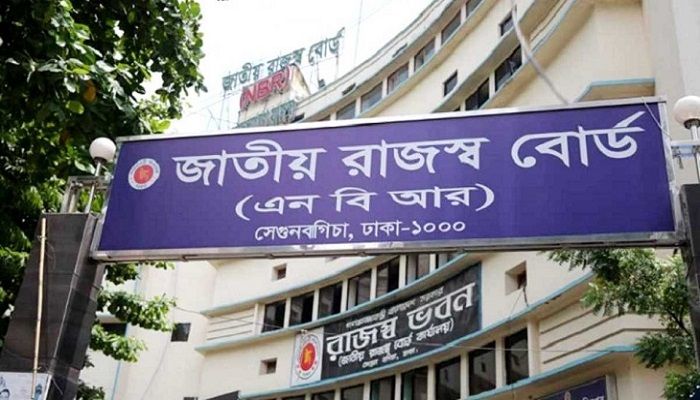
Desk Report
Publish: 24 Jun 2020, 12:55 pm

The government has opted to clamp down on the Value Added Tax (VAT), specially from the 40 lakh small and medium enterprises, for increasing its revenue collection in the coming days.
"Although this sector holds an immense prospect for VAT revenue, the collection of VAT from this sector is very challenging," a senior official of the National Board of Revenue (NBR) told UNB.
He said that currently, only 3 percent of total VAT is collected from this small and medium enterprises sector manually.
"We are planning to increase the stake of VAT collection from this pocket significantly," he said.
The NBR official said that VAT wing will provide the highest part of the revenue collection, which is 37.9 percent.
To improve the tax-GDP ratio of the country, which is lowest among the South Asian countries, the VAT collection has to be increased, he added.
The total revenue collection target for the proposed budget for 2020-21 fiscal is Tk 378,000 crore where the NBR will contribute Tk 3,30,000 crore. The revenue from non-NBR sources was estimated at Tk 15,000 crore, while non-tax revenue at Tk. 33,000 crore.
Of the grand amount for the NBR, Tk 103,945 crore will come from income, profit and capital tax, while Tk 125,162 crore will be contributed by VAT, supplementary tax will provide Tk 57,815 crore, Tk 37,807 crore will come from import duty, Tk 55 crore from export duty, Tk 3,686 crore from the excise duty and Tk 1,530 crore as other taxes.
For effective enforcement of Value Added Tax and Supplementary Duty Act 2012, the government has automated VAT registration process and Return submission activities under the VAT Online Project.
As per the available data some 170,000 persons have already got VAT registration using the online platform. Moreover, taxpayers are submitting return through the online system which is getting popular every day. Almost 35,000 taxpayers submit return through online system regularly.
E-payment module has been prepared by the project which shall be implemented soon. Digitized VAT management system developed by the Project will reduce cost of doing business remarkably, and bring dynamism, transparency, and accountability in the VAT administration.
A few years back, the government was planning to use the automated system in this sector for collecting VAT. After exploring ideas from different countries, Electronic Cash Register (ECR) was introduced for some selected services. But the ECR technology did not fulfill our expectations due to some technical shortcomings. The technology had been reviewed thoroughly to identify its limitations.
Thereafter, the government has decided to introduce the latest technology named 'Electronic Fiscal Device' (EFD). A plan has been taken up to install 10,000 EFD machines at the initial stage.
"Later on 5 lakh machines will be installed throughout the country in phases," the NBR official said.
Finance Minister AHM Mustafa Kamal in his budget speech said that due to some formalities of procurement, installation of EFDs in business units was delayed.
Finally, he said, it was planned to inaugurate the EFD installation in the last week of March 2020 to commemorate the Mujib Borsho. All the formalities were completed, but the installation was again delayed due to the outbreak of COVID-19 pandemic.
"We will do the installation on a priority basis once when the coronavirus situation subsides. We hope that we can distribute EFD to business units within this Mujib year," he said while placing the budget for 2020-21 fiscal in Parliament.
The NBR has taken an initiative to procure and install 10,000 EFDs in 13 types of business entities from next year in a move to check VAT evasion and enhance collection.
The new EFD will replace the electronic cash register (ECR) and the point of sale (POS).
The 13 types of businesses included hotels, restaurants, fast food shop, confectioneries, jewelers, beauty salons, furniture shop, RMG shop or boutique shop, electronics shop, community center, all business entities in posh shopping mall, departmental stores, general shop or super shop, wholesalers and large retail stores.
The NBR official said that EFDs will help curb evasion as these would be connected with the server that will generate real time data of sales at shops.
The EFDs will be connected online with a server at the NBR. Any entry from a particular business entity will be registered at the server of the NBR.
"This will bring transparency and the scope to evade the tax will be restricted. As a result the revenue collection will be improved," the senior NBR official said.
If any business entity does not use this EFD or any deviation of using this is proved that entity will have to pay Tk 20,000-50,000 as fine. If this kind of offense committed repeatedly then the NBR will lock the offender’s Business Identification Number (BIN).
At present, several thousand shops use electronic cash registers and point-of-sale machines. However, all of the business entities are not currently using the device to issue sales invoices to customers and hide actual transaction figures from taxmen.
The NBR had made the e-cash mandatory in 2008 for 11 types of businesses: hotels, restaurants, confectioneries, jewelers, beauty salons, wholesalers and large retail stores.
Allegations are widespread that many businesses do not use the e-cash register even after installation to evade VAT allegedly in connivance with field officials of the revenue authority.
Source: UNB
Subscribe Shampratik Deshkal Youtube Channel
© 2024 Shampratik Deshkal All Rights Reserved. Design & Developed By Root Soft Bangladesh